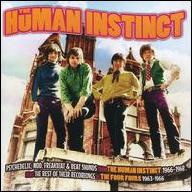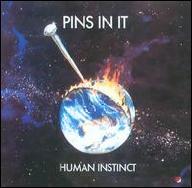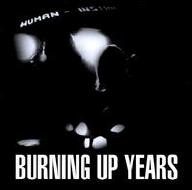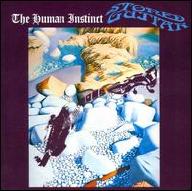The Human Instinct story began in 1957, with the birth of the Four Fours. That year, pianist Mike Horman and clarinet player Colin Minifie formed a dance band to play a steady flow of gigs in Tauranga, a popular vacation destination in New Zealand. Within a year, the duo had expanded to a quartet with the addition of drummer Trevor Spitz and saxman Rob Smith, and they began adding rock & roll tunes to their repertoire. They adopted the name the Four Fours (from the common 4/4 time signature), and recruited Bill Ward to play lead guitar and sing. Before long, the Four Fours were performing regularly in Tauranga, both at a late-night club called The Inferno operated by Spitz, and at teen dances promoted by the group. In 1960, Colin Minifie dropped out of the band and Dave Hartstone came on board, playing rhythm guitar and singing backups. For a while, Rob Smith's brother Richard was regularly sitting in with the band as a vocalist; he later relocated to England, changed his name to Richard O'Brien, and found fame as the author of the cult musical The Rocky Horror Show.
In 1963, the New Zealand-based Allied International label signed the Four Fours, and they released their debut single, "That Happy Feeling" b/w "Janice B." By this time, Mike Horman was serving double duty on piano and bass, but when the group decided to relocate to Auckland, Horman opted to stay behind, as did sax player Rob Smith. Frank Hay, who knew Spitz through working at The Inferno, joined the group in time to make the move, and they stepped forward as a quartet. It didn't take long for the Four Fours to become one of the busiest bands in Auckland, and 1965's "Time Slips Away" b/w "Theme from an Empty Coffee Lounge" became a hit when the B-side unexpectedly won the favor of audiences. In late 1965, the Four Fours began mapping out plans to move to England in hopes of winning a larger audience. Drummer Trevor Spitz developed cold feet and chose to stay behind, and Maurice Greer, an outgoing stand-up percussionist from a Palmerston North combo called the Saints (no relation to the pioneering Australian punk combo), accepted an offer to join the band. The Four Fours left Allied International for Zodiac Records; their first single for the label, "This Time Tomorrow" b/w "Trucking Blues," was released in time for them to hit the road as the opening act for the Rolling Stones on their 1966 tour of New Zealand. After the release of "Go Go" b/w "Don't Print My Memoirs," which became another NZ hit, the Four Fours boarded the Fairsky, an ocean liner sailing from New Zealand to London in September 1966. En route, the members of the group decided they needed to adopt a new name that reflected the changing tides of rock & roll. When they arrived in England, they were billing themselves as the Human Instinct.
After settling in England, the Human Instinct quickly landed a recording contract with Mercury Records, which had been tipped off to the Four Fours' talents by the staff at Zodiac Records. Their Mercury debut, "Can't Stop Around" b/w "Want to Be Loved by You," was issued in November 1966 and found the band moving in a leaner and more R&B-influenced direction. After an initial period of struggle, the Human Instinct made an impact on the British club scene and were gigging regularly, headlining clubs and sharing bills with the likes of the Spencer Davis Group, the Jeff Beck Group, the Herd, and the Moody Blues. While the group cut two more singles for Mercury, "The Rich Man" b/w "Illusions" and a remake of "Go Go" b/w "I Can't Live Without You," none made the charts, and after their deal was up, they signed with Deram Records, where producer Mike Hurst helped them put their growing psychedelic leanings up front on 1967's "A Day in My Mind's Mind" b/w "Death of the Seaside." The Human Instinct had upgraded their backline to include a full complement of Marshall amplifiers that beefed up their guitar attack, and their second Deram release, early 1968's "Renaissance Fair" b/w "Pink Dawn," was their most sophisticated to date, and included arrangements featuring the London Symphony Orchestra. A few months after the release of their second Deram 45, the Human Instinct were still without a hit record, and several members held work visas that were soon to expire. Dave Hartstone, who held a British passport, opted to stay behind, and the remaining members of the band chose to return to New Zealand and regroup. While Hartstone had agreed to take over payments on the group's van, his bandmates were upset when he declined to ship their amps back home, and Hartstone quickly moved away from performing to a career road managing groups on tour (including Led Zeppelin) and renting sound and lighting equipment to major touring acts
After the loss of their gear, Bill Ward became disillusioned and dropped out of performing for many years, and Frank Hay soon followed. But Maurice Greer was determined to keep the Human Instinct alive, and he launched a new edition of the band with guitarist Billy Te Kahika (aka Billy TK) and bassist Peter Barton, which followed trends of the day into a sound informed by hard rock, while Te Kahika was clearly influenced by Jimi Hendrix. A return trip to England didn't fare as well as the group had hoped, but they bonded with fellow New Zealand rocker Doug Jerebine, who was also trying his luck in the U.K. Jerebine had been writing and recording under the name Jesse Harper, and Greer thought his material had potential. With Jerebine's OK, the Human Instinct added a number of his songs to their repertoire, and they would dominate the set lists of the group's first two albums, 1969's Burning Up Years and 1970's Stoned Guitar. By the time Burning Up Years was completed, Peter Barton had stepped down from the Human Instinct, and Larry Waide took over on bass; Waide bowed out after the release of Stoned Guitar, and Neil Edwards became their bassist in time to cut their third album, 1971's Pins in It. After Pins in It came out, Billy TK resigned from the Human Instinct, and from that point on, Maurice Greer became the sole constant member as the group reconnected with Zodiac Records and cut the albums Snatmin Cuthin? (1972) and The Hustler (1974). In 1975, the Human Instinct cut an album titled Peg Leg, but it went unreleased, and the band briefly broke up. Greer would revive the group and they would soldier on as a live act for the next several decades, but they went without releasing a record until 2009, when they brought out the album Midnight Sun, which featured guitar work from Billy TK on two cuts. (Peg Leg was given a belated release in 2002.) Maurice Greer continued to lead a version of the Human Instinct well into the 2010s; Zodiac Records issued a three-disc box set of the albums Snatmin Cuthin?, The Hustler, and Peg Leg in 2010, while the British RPM label brought out 1963-1968, a collection of their best singles in their Four Fours and Human Instinct incarnations, in 2019. ~ Mark Deming, Rovi





















